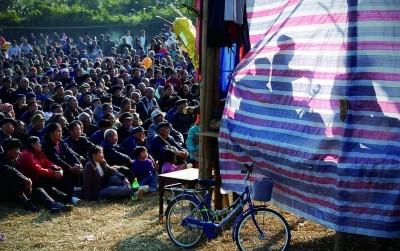Due to the convenient land and water transportation in Fairy Temple Town, after the middle of the Qing Dynasty, the two major industries of rice and wood developed rapidly. With the continuous development of the commodity economy and the continuous prosperity of the consumer economy, people's spiritual needs are also gradually improving. As a result, opera entertainment performances also came into being.
There are roughly three types of ancient opera stages in the town of Fairy Temple:
Grass platform. After the autumn harvest, farmers have free time, the countryside also has free space, and in the season of celebrating the harvest, grass platforms appear.

The grass platform, as the name suggests, is a temporary performance stage made of bamboo, wood, rope and cloth curtains. It is shaped everywhere, the material is easy to obtain, easy to build, and easy to dismantle. It is said that in order to shade the sun, straw and wheat grass are often laid on the top of the platform, so it is called a grass platform. Because it is performed on the "grass stage", this play is called "grass stage play", and the drama team of this performance is also called "grass stage team".
Grass platform, although simple, but easy to do. The grass-based team is small in number, the cost is not large, the mobility is strong, the peasants can afford it, and it is also suitable for touring the countryside. Although caotai opera lacks a certain degree of artistry, it is rich in a wide range of masses, so it is popular with rural farmers.
Wannian Tai
Temple platform. That is, a stage built in a temple. Rural performance activities developed from the origin of exorcism and blessing and worship of gods and ghosts, and it is often combined with temple fairs. Therefore, generally larger temples will have temple platforms, also known as "shrines". The masses called it "Ten Thousand Years Platform", which means "long lasting, thousands of generations". The YuWang Palace in the town of Fairy Temple, the Fairy Temple has such a "Ten Thousand Years Platform".
As soon as the Fairy Temple entered the main entrance, a "Ten Thousand Years Terrace" was built. Above the wall of the Wannian Terrace there are four characters of lacquered book "Song and Dance Shengping", and below it are painted sea waves and red suns. The lintels of the side doors on both sides are fan-shaped, with "Dragon Fly" carved in the east and "Wind Dance" in the west. There are also rest rooms on the left and right. The Theater Taipei Courtyard is the place where the audience watches the play.
stage. That is, the performance stage built by public building venues such as guild halls and ancestral halls. The grass terrace is limited by the season and the region, and the temple platform is limited by the number of people. In order to meet the needs of business and society and meet the needs of the public to watch plays, people use public buildings such as guild halls and ancestral halls to set up stages and become perennial performances.
Double Peach Resort. On the west side of the Yu Palace, it was built for Jiangxi carpenters in the middle of the Qing Dynasty. The stage is made of wooden planks, the seats are benches for the temporarily rented masses, and the lighting is gasoline lamps, which can accommodate more than 600 people. The general peking opera repertoire of performances includes: "Guan Gong Xianling", "Scolding Lantern", "The Legend of the White Snake", "Lin Huiniang", "Five Sons Crying Grave", "Pearl Tower" and so on. The actors are: Pan Xiyun, Xiao Jinlan, Lin Yulan, Wu Xiaotong, Huang Xiaobo and so on. In 1949, the performance was discontinued and later changed to Jiangdu Cinema.
Fang Family Ancestral Hall. On the north side of the Old Jiangdu Hotel. It was built in the middle of the Qing Dynasty. The stage is also temporary, and the audience brings their own benches. The Yang opera repertoire performed includes: "Sanmen Street", "Harvest Xu Da", "Peach Blossom Girl", "Four Old Masters Playing Noodle Jar" and Lian ben drama. The actors are: Ten-year-old tong (Yin Huating), Wang Yalan, Wang Xiulan, Xiao Zixia (Chen Biqiu), Kong Zhaobing, etc. The time is about a year or so. (Zhu Yuqi)